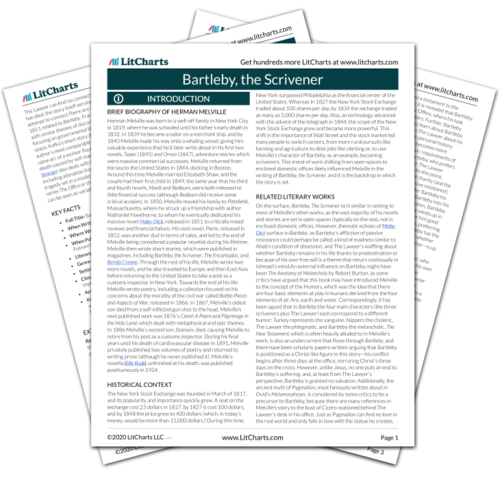
The lawyer’s relationship with Bartleby is that of employer to employee they are engaged in a power dyad in which there is a dominant agent (the lawyer/employer) and a subordinate one (Bartleby/employee). In this sense, then, the lawyer gains a measure of control over the scriveners (in general) and Bartleby (in particular) which he does not demonstrate in his own tale. “Nothing is ascertainable,” he informs us, “except from the original sources” (135) since the lawyer, however, is one of those original sources, his authorship of the tale is justified. It is through the authority of thirty-years’ experience that the lawyer can justify his obsession with Bartleby since, as the primary authority of the lives of scriveners, who can question his decision to “waive the biographies of all other scriveners” in order to write “a few passages in the life of Bartleby” (135)? Even though he admits he could “relate divers histories” of the other scriveners, he declines to do so, even while acknowledging that a complete biography of Bartleby would be an impossibility. By means of his broad personal experience with scriveners and the paucity of other written material about them, the lawyer lays claim to a measure of expertise about the subject.


An ‘unambitious” lawyer who works ‘in the cool tranquility of a snug retreat,” doing “a snug business among rich men’s bonds, and mortgages, and title-deeds” (136), the narrator informs us in the second sentence of the first paragraph that he has been brought into “more than ordinary contact” with scriveners, “of whom, as yet, …nothing has ever been written” (135). In the opening paragraph of “Bartleby the Scrivener,” the narrator is careful to establish for the reader his authority to tell the story which follows. Authority and Authorship: The Establishment of Power in Melville’s “Bartleby the Scrivener”


 0 kommentar(er)
0 kommentar(er)
